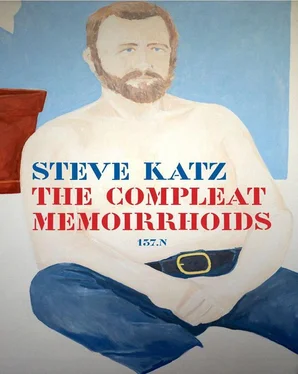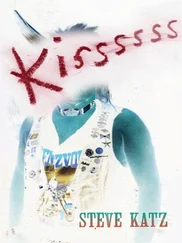Jesse Hart Benton, from St. Louis, daughter of the influential painter Thomas Hart Benton, was the principal eminence staying at the Bartolini. She was modest and chummy. Several of us went to the American Cinema to see some American movie. When I turned around I saw behind us a monk making out with a girl under his cassock. I was amazed. I asked the woman who managed the pensione about this and she said with a shrug, “What do you expect? He’s a man, after all.” A British woman who stayed in a room down the hall, very Oxbridgy, was impressed with my obsession with the Masaccio. She offered to polish my shoes. This was such a strange offer, and so earnest, that I couldn’t respond. “I do that for my brothers,” she said. “My grandmama told me to find a man who has compelling interests if I want a successful marriage.” I steered clear of her as my perception of Florence widened. There was, after all, the Ponte Vecchio. There were traffic police raised on platforms to direct traffic at the intersections, their hand gestures elegant and precise, their white gloves like flashes of white moth wings. Obviously they’ve been replaced by traffic lights. There was The Duomo, Giotto’s Battistero , endless great stuff to discover. Fra Angelico at San Marco. Michelangelo’s David . Ghiberti’s door. Not to mention bistecca alla fiorentina, mozzarella in carozza, carciofi & cervelli, zuppa pavese , etc. etc. There was the passegiata every evening, such strutting elegance in the Piazza della Signoria, along Via Ricasoli, through the Piazza Duomo. And any time I wanted I could walk to the Carmine and for fifty lire I could light up the Tribute Money .
1
Sybil wanted to meet my mother. That was a surprise. Sybil Stork protected herself from entangling relationships by retreating, hiding, distancing. It was a dance that kept me off balance, but held my interest more than if she were open and accessible. In the first place I was surprised she wanted to come to New York with me. I met her after a reading I gave in Fort Collins. I was getting over a bad break-up and she was like my emotional rescue. She lived in a low rent apartment in Fort Collins. There was no shower. She washed up by sneaking into the shower at the Y Small, pretty, pony-tailed blonde, one wouldn’t expect her great dumpster-diving mentality. She had resolved to live on the cheap, never to work if she could avoid it. A caveat for her was the fate of her father in Detroit, a talented artist and designer, who had given his life and squandered his talent for General Motors. She had inherited his fine hand for drawing. A compassionate and generous person, she had entered into a mariage blanche with an invalid from Columbia, who needed medical treatment in the US. Aside from being attracted to her, I admired everything about her life.
For this year I had sublet Larry Fagin’s double apartment on Twelfth Street between First Avenue and Avenue A. The building was a poet’s dormitory. The great John Godfrey lived there. Allen Ginsberg lived there for a while. Rene Ricard lived right across the hall. It was Richard Hell’s building. Larry’s set-up was perfect. Sybil could have a separate studio. I appreciated the opportunity to spend some time with her. I’d explained to her how difficult my mother was for me, and so I was surprised that she was curious enough to come on the visit.
Sally Katz, my mother, lived in the Hotel Greystone, a residence hotel on Broadway, on the upper West Side. I imagine it seemed exotic to Sybil, this hive of old women, mostly Jewish, who gathered in the lobby of the hotel, humming with gossip and opinions. They eyed with suspicion every stranger who crossed their gauntlet. My mother was in her little studio apartment, dressed as usual in pajamas and robe, her room neat, smelling of lavender, her potted plants thriving, the television always on at the foot of her bed. As always she had a package of hotel towels she insisted I be complicit in stealing.
“These belong to the hotel, mom.”
“It’s okay. I pay plenty for the room.”
“Maybe if you didn’t steal towels the rent would go down.”
“Take them. It’s not stealing. I’m your mother.”
She’d had a difficult life, having to take care of her father till he died, and raise her younger sisters on the lower East Side. She also tended my father, who was sick for a long time before he died, leaving her impoverished, with myself still at home. She took a job with the city, in the auditor’s office, and often complained of how heavy the ledgers were she had to haul around. The onus of being required to express love for her made it almost impossible for me to do so. She demanded it, and prohibited it. I saw this in terms of breadsticks. Every time I visited I was required to bring breadsticks. No matter where I went to get them, Little Italy, Houston Street, Zabar’s, I could never get the right breadsticks. They were too hard for her poor teeth, or too soft for the idea of a perfect breadstick in her mind, over baked, underdone. I chased all over the city. I was swimming upstream against a current of failed breadsticks, never had a chance. Whatever sticks I brought put her in a bad mood and reflected my filial inadequacies. Occasionally I could nudge her into her sense of humor, which was often rich, particularly when she recollected life on the lower East Side. Most often my sons or myself had to confront her bitterness at being dealt such a tough hand.
I introduced her to Sybil, and we settled in to a loaded silence. My mother immediately liked Sybil. The female bonding was palpable in the room. That probably accounted for the bizarre sequence that followed.
“Steve, dear,” my mother said. “Will you go downstairs to the desk and get my strongbox and bring it up here. I’ll call down.”
When I returned with the box, Sybil and my mom were conversing nicely. My mother was able to get closer to her in a few minutes than I had in all the months I’d been seeing her. My mother pulled a sealed white envelope out of the box. She handed it to me. “For my son Steven,” was written on the envelope in my mother’s neat cursive. “To be opened after my death.”
“Open it,” my mother said.
I hesitated, looked at Sybil. She was waiting to see what would happen, an enigmatic smile on her pretty face.
“What are you waiting for?” insisted my mother.
“You’re not dead yet.” I laughed inappropriately, and held the letter at arm’s length as if to hand it back. This was a comic situation that wasn’t funny.
“Open.”
“Now?”
“Open the letter.” I did as I was told.
“Read what I wrote,” my mother insisted.
I slipped the sheet of paper from the envelope, unfolded it, and started to read.
“Read it out loud. You can read out loud.” She was trembling. She removed her glasses and wiped her eyes.
Sybil, I could see, was fascinated. Images of detergents and pain relievers sold product across the TV screen, its sound muted. The text I read went something like this:
My dear Steven, Do not grieve for me now that I am dead. I have had a very difficult life and am happier where I am now. My last request is that I be cremated and that my ashes be scattered into the Hudson Riverfrom the George Washington Bridge, followed by a single red rose .
That was the gist of it. I heard myself saying the words, as I adjusted the tone away from the mockingly sanctimonious to something more neutral. Sally Katz relished the moment, tears running down her twitching face. She indulged herself in the pleasure of being witness to her own funeral. She and Sybil exchanged quick smiles. I felt like a son from another planet.
Читать дальше












